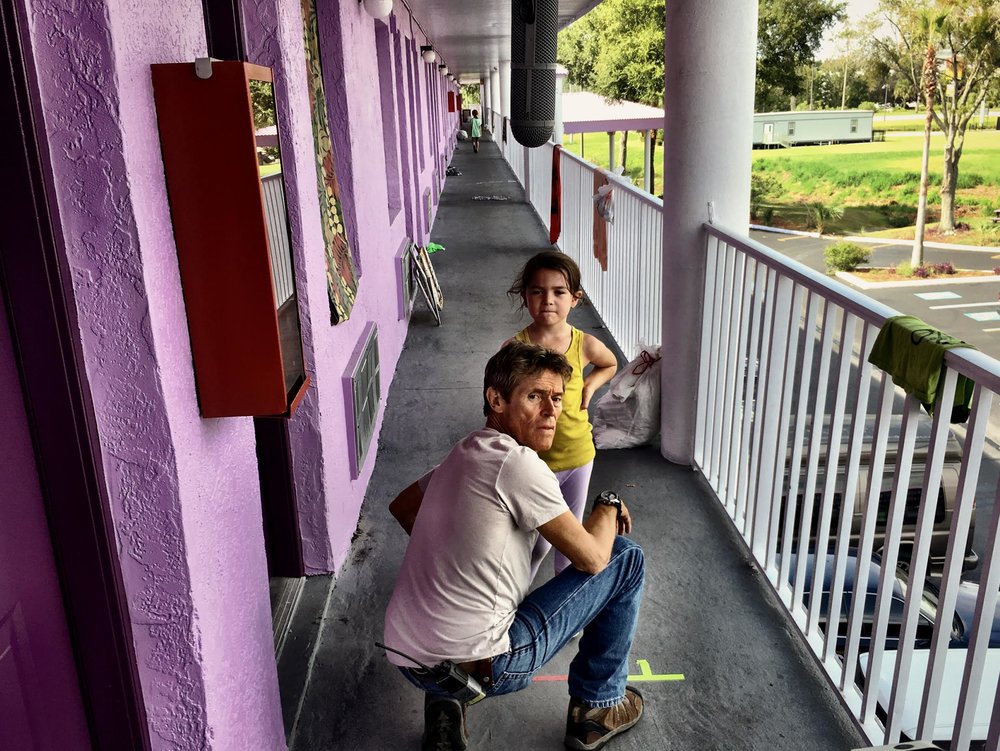
Friday Flicks | Movies | Arts & Culture
Telling a story from the perspective of a child can be a tricky thing to do. One must drop the artifice, social acclimation, worldliness, world-weariness, and slightly larger vocabulary that come with adulthood, and reach for something a little bit different. Not simpler, per se, but more guileless and open.
The Florida Project, the latest movie from writer-director Sean Baker, captures perfectly that childlike eagerness to revel in the present, to find here and now’s endless capacity for laughter and joy without any sort of pretense. The film comes to theaters in New Haven this weekend.
For Moonee (Brooklyn Pierce), Scooty (Christopher Rivera), and Jancey (Valeria Cotto), summer days blend seamlessly together as they share ice cream, taunt adults, and explore the furthermost reaches of their neighborhood.
But Baker, whose previous movie Tangerine focused on a competitive friendship between two transgender prostitutes working the seedier side of the Hollywood strip, is not interested in an idyllic childhood summer experienced by the bored and the comfortable.
Rather, The Florida Project is another story about vibrant, incandescent outsiders living on the razor’s edge of poverty.
 Courtesy of TIFF
Courtesy of TIFF
Moonee, Scooty, and Jancey live with their single moms and single grandmas in pay-by-the-week motels on the outskirts of Orlando, Florida. For these three kids, who can't be older than five or six, getting ice cream means walking blocks through empty strip mall parking lots and then shaking down nearby customers for loose change; taunting adults means joyfully spitting on the cars of strangers and then flipping them off when they demand that the kids stop; and exploring the neighborhood means swinging irons bars and lighting fires in an abandoned condo complex crumbling under the weight of its mold, debris, and decay.
After a particularly dangerous bit of summer fun leads Scooty’s mom to pull her son from Moonee’s company, both to keep him safe and to reduce the likelihood of a visit from the Department of Children and Families, Moonee spends more and more of her summer with her unemployed mom, Halley (Bria Vinaite).
An ornately tattooed, twentysomething beauty who spends most of her time chainsmoking in her pajamas over the third-story rail of the hotel, Halley shares Moonee’s exuberance, spontaneity, and indifference to the future, and is clearly the source of her gleeful profanity and unwavering hostility to authority.
But Halley is also an adult and a parent, and her stubborn insistence on enjoying the present, no matter the depths of her love for Moonee, have consequences that far outweigh any trouble that her daughter may get in while playing with her friends around the edges of the hotel.
In setting this story of childhood ebullience in a rundown hotel on the outskirts of Orlando, in the heart of a knockoff economy that thrives off of its proximity to Disneyworld, Baker conjures a powerful juxtaposition between the most artificial, commercialized, grotesque fantasies of adults and the more authentic, imaginative, carefree play of children.
To Moonee and her friends, the giant wizards, purple castles, and sickly, oversized marketing displays that define their built surroundings are just part of the backdrop for a world abundant with the promise of cheap pleasures. But for these children, those pleasures are supplemented by a fantasyland they are able to create wherever they are, regardless of the lack of money in their pockets.
Baker and cinematographer Alexis Zabe follow the children with tracking shots low enough to the ground that the audience feels like it too is in on the play, and that this play is not just about fun, but about taking ownership over their surroundings and their time. When Baker and Zabe step back for a wideshot of the bright-purple hotel in all its communal, doorfront activity, the place bustles like a living dollhouse out of a Wes Anderson movie.
But this is not a dollhouse, and the similarities between Moonee’s and Halley’s experience of the summer disturb as much as they delight.
One of the more effervescent scenes in the movie sees Halley, Mooney, and Jancey hitchhike miles from their hotel at night so that they can find a dark place to sit, sing happy birthday to Jancey, eat birthday cupcakes, and watch the fireworks explode over Disneyworld. “These fireworks are just for you,” Halley tells Jancey, and everyone at that moment believes it.
There’s a wonder and a beauty to such a personal reclaiming of an impersonal, commercial spectacle. But Halley’s inability to break through her own self-delusions grates violently against her inability to provide a stable and safe life for her and her child. By the end of the movie, the fantasies that both Halley and Mooney retreat to are no longer the ones governed by the delights of the imagination, but by fear and desperation to flee an inescapable reality.

